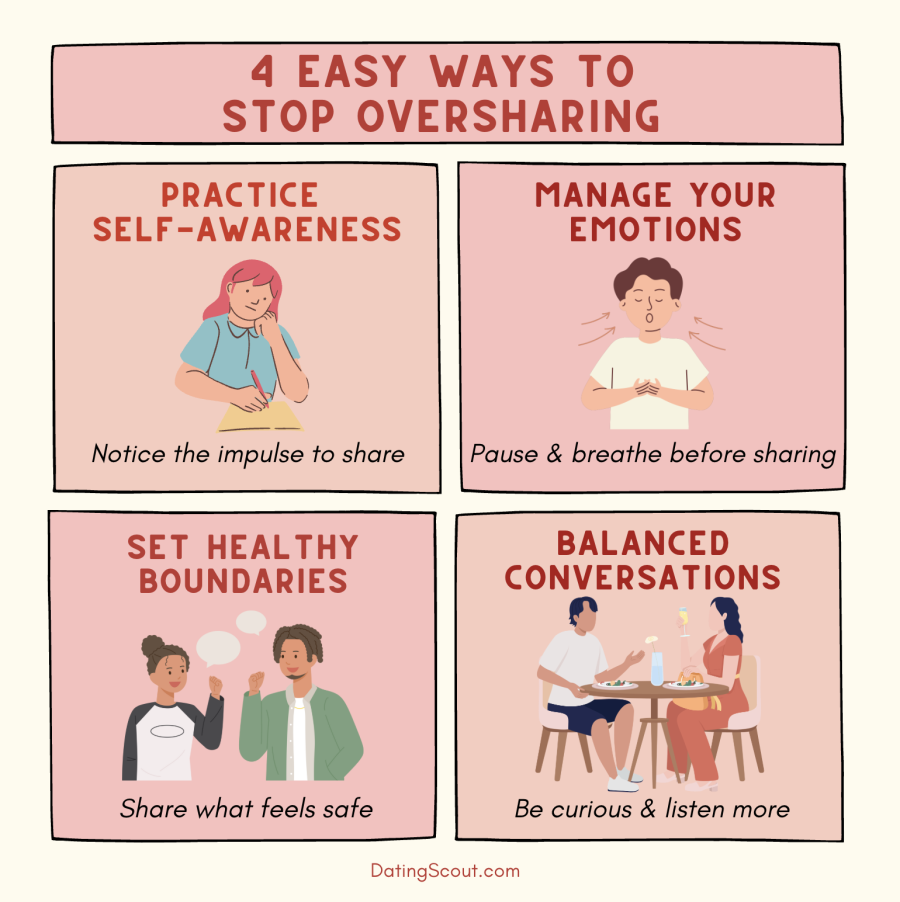Why You Overshare in Relationships & How to Stop Pushing People Away
Have you ever felt like you share too much, too soon with someone you like? You might think that telling them everything about you will make them stick around, but it often ends up doing the opposite.
If you often overshare and wonder why it drives people away, it's important to understand why and find out how to share just the right amount.
Discover why you overshare and how to stop it from ruining your relationships in this article.
What Is Oversharing?
Oversharing in relationships happens when you share very personal or emotional details too early, before trust has had time to develop.
You might open up about past breakups, childhood trauma, or mental health struggles, hoping it will bring you closer. Instead of creating connection, oversharing often leaves the other person feeling uncomfortable, overwhelmed, or even pushed away.
In dating, especially early on, emotional boundaries are important. When you reveal too much too soon, it can come across as pressure instead of intimacy.
Healthy relationships take time to grow, and learning to open up at the right pace helps build trust, emotional safety, and real connection. Noticing when and why you overshare is the first step toward breaking the habit.
10 Common Signs of Oversharing
Oversharing can feel like honesty, but too much too soon often pushes people away. Here are 10 signs to watch for.
1. Opening Up Too Soon About Personal Topics:
You’ve just met someone, and you’re already talking about your deepest fears, past relationships, or family struggles before trust has been established.
2. The Conversation Is One-Sided:
When you’re talking to someone, the focus tends to stay on your life, experiences, and feelings, with little space left for the other person to share.
3. Missing Signs of Discomfort:
You keep talking even when the other person seems disengaged, changes the subject, or shows subtle signs they’re feeling uneasy.
4. Seeking Validation:
You often share personal experiences in hopes of receiving praise, comfort, or reassurance from others.
5. Oversharing the Details:
You include very personal or intimate details that most people would only share with close friends or partners over time.
6. Emotionally Dependent on Reactions:
Your mood shifts dramatically based on how others respond to your personal stories or disclosures.
7. Struggling to Hold Back:
You feel a strong urge to share, even when part of you knows it might not be the right time or setting.
8. Turning Stories Into Unsolicited Advice:
You bring up your personal experiences to offer advice, even when the other person hasn’t asked for it.
9. Disregarding Feedback:
Even when friends or family mention you tend to overshare, you find it hard to pull back or adjust your habits.
10. Overstepping Social Boundaries:
You may not realize when your sharing crosses personal lines, potentially leaving others feeling awkward or emotionally overwhelmed.
Noticing these signs is a good first step. With better boundaries and timing, you can share in a way that builds connection, not distance.
The Psychology Behind Oversharing
Oversharing often stems from an anxious attachment style; a pattern where you fear being rejected or abandoned, and try to feel safe by getting close to others quickly. If you have this style, you might constantly worry about whether someone truly likes you or will stick around. To ease that anxiety, you may share a lot upfront, hoping it will create a strong emotional connection. But instead of pulling people closer, it can sometimes overwhelm them and push them away.
Here are some common reasons you might find yourself oversharing:
Seeking Connection
You deeply want to bond with others and may believe that opening up quickly will fast-track emotional closeness.Insecurity
You might feel unsure about your worth or fear not being accepted. Oversharing can feel like a way to prove you’re genuine or to gain approval.Poor Boundaries
You struggle to gauge what’s appropriate to share, especially early in a relationship, and may not realize when you’ve crossed personal or social boundaries.Excitement
When you’re enthusiastic about a new friendship or relationship, you may become swept up in the moment and share more than intended.Trauma Response
If you’ve been through difficult experiences, sharing your story quickly can feel like a way to reclaim power or control. It may also be an attempt to filter out people who can’t handle your truth.ADHD and Impulsivity
People with ADHD may have difficulty with self-monitoring and impulse control, leading them to share personal thoughts without pausing or picking up on social cues.Coping Mechanism
Oversharing can sometimes soothe emotional discomfort. It might help you feel seen, reduce anxiety, or create a sense of control when life feels chaotic.
These patterns often trace back to your attachment style, which influences how you connect with others and seek emotional closeness.
Take the Quiz: What’s Your Attachment Style?
Your attachment style can shape behaviors like oversharing more than you might realize. Understanding it can help you recognize your patterns and build more balanced, secure connections. Take the quiz to identify your style and understand what’s driving your relationship habits:
How Oversharing Affects Your Relationships
Oversharing might feel like a way to build closeness, but revealing too much too soon can quietly harm your relationships. Instead of creating connection, it can lead to discomfort, emotional distance, and even mistrust.
Pushing People Away
When you share very personal details early on, it can overwhelm the other person. It’s like trying to pour a full bucket of paint into a small cup. There simply isn’t enough space, and the overflow can leave the other person feeling uncomfortable or emotionally flooded. Most people need time to process emotional information, and when they’re rushed, they may pull back.
Creating Imbalance
Healthy relationships grow through mutual sharing at a steady pace. If one person opens up quickly while the other is still finding comfort, the dynamic can become unbalanced. This misalignment often creates pressure rather than connection, making it harder for trust to develop naturally.
Becoming Vulnerable to Manipulation
Sharing private information before trust is firmly established can leave you exposed. If the other person isn’t trustworthy, they may use what you’ve shared to manipulate or take advantage of you. It’s like giving someone access to your personal space before you really know their intentions.
Understanding how oversharing affects your relationships can help you become more mindful about what you share and when. With thoughtful pacing, you can create stronger, more balanced connections built on mutual trust and emotional safety.
How to Stop Oversharing: 4 Simple and Effective Tips
Keeping conversations balanced is important for building healthy relationships. If you often find yourself sharing too much too soon, these simple strategies can help you open up in a way that feels safe and comfortable for everyone.
1. Practice Self-Awareness
Notice the moments when you feel the urge to overshare. Is it when you're nervous, excited, or trying to connect quickly? Jotting down these patterns on your phone or in a journal can help you identify emotional triggers and become more mindful before you speak.
2. Build Emotional Regulation
If you feel the pressure to spill everything at once, take a breath and pause. Simple techniques like counting to ten or focusing on your breathing can help you calm down and think clearly. This gives you time to decide what’s worth sharing in the moment.
3. Set Healthy Boundaries
Decide in advance what you're comfortable sharing and what you'd prefer to keep private. Think of it like deciding which parts of your life are public and which are personal. Start with general topics, and share deeper details only with people who have earned your trust over time.
4. Improve Communication Skills
Ask yourself, “Does this really need to be said right now?” Try to keep conversations balanced by listening actively and showing interest in the other person’s story too. Asking questions and giving space helps create more mutual and engaging conversations.
Conclusion
Oversharing doesn’t make you weak, it usually means you’re craving connection and safety. But real closeness isn’t built by saying everything at once. It grows when you share the right things, at the right time, with the right person.
By becoming more aware of your triggers, setting clear boundaries, and practicing mindful communication, you can express yourself honestly without overwhelming others or yourself. That’s how you build trust and connection that actually lasts.













